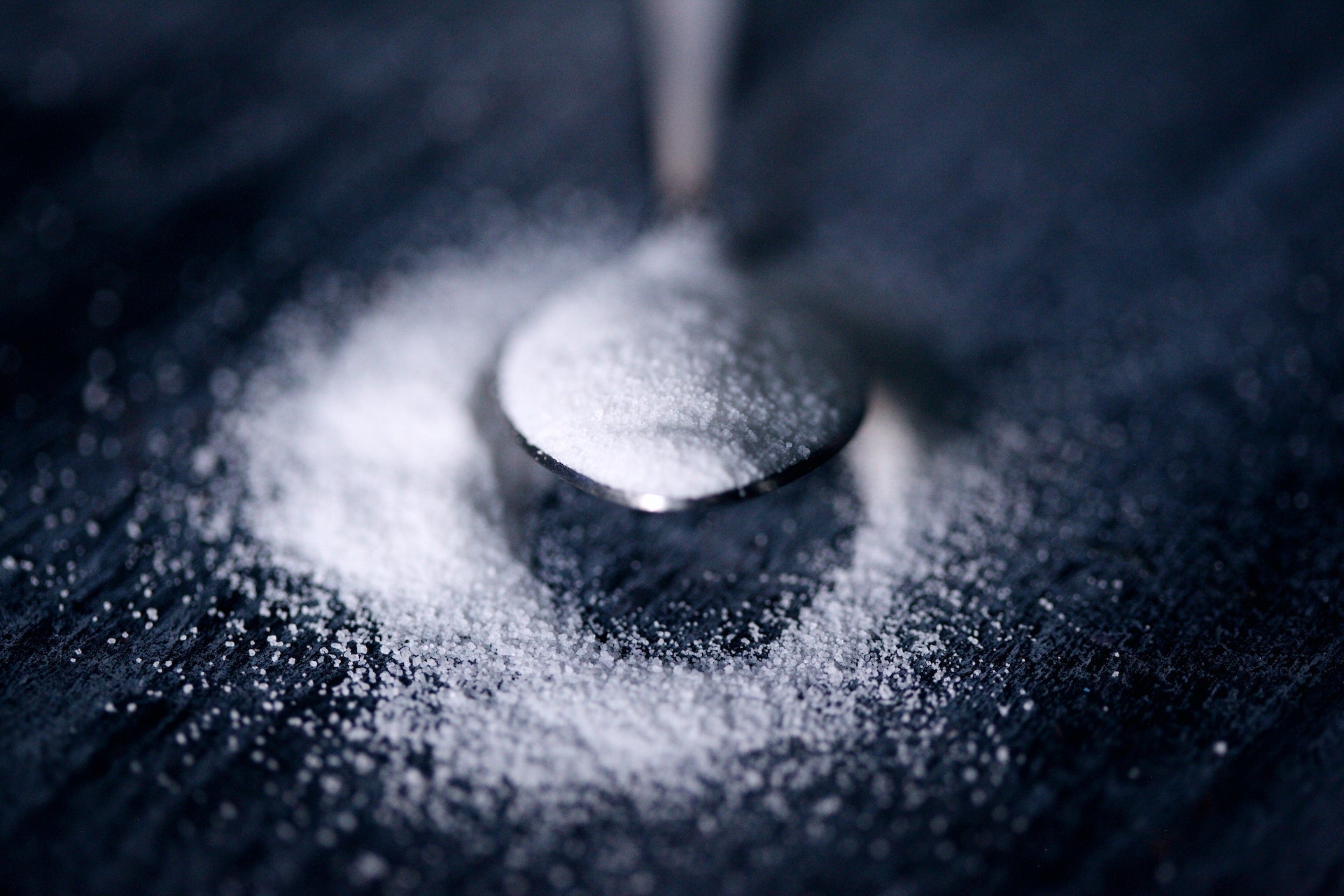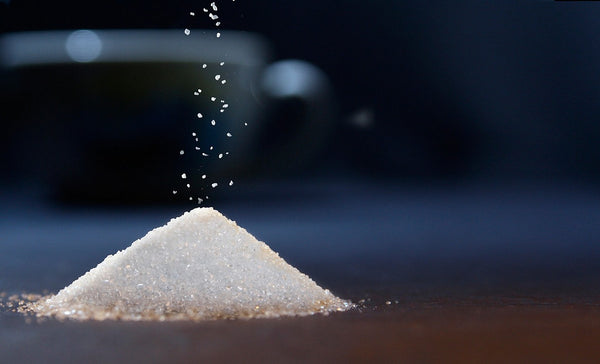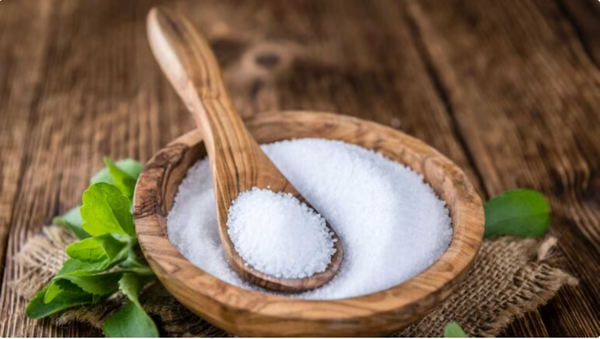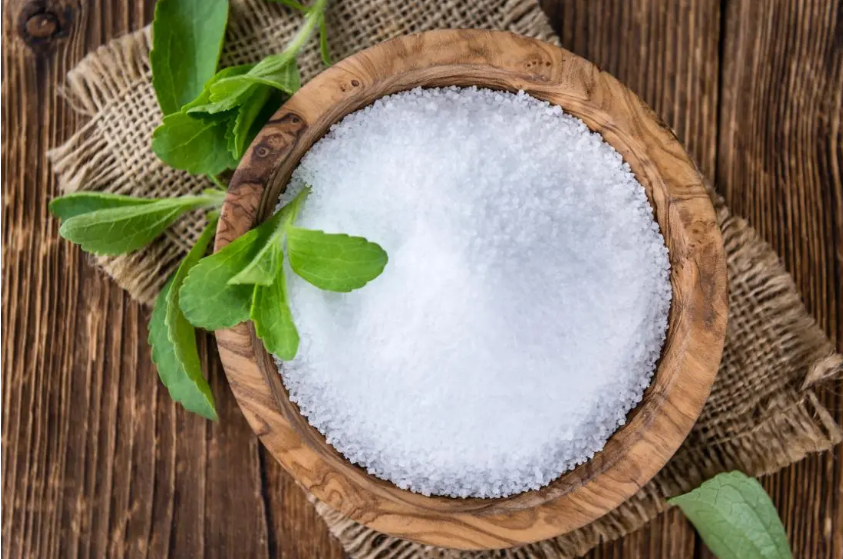
Stevia Vs Sugar: Which is Good for Your Health?
Indulging in sweetness is one of the simple joys of life. However, an excess of sugar in your diet can have adverse effects on your well-being. Countless studies extensively show the negative consequences of excessive sugar consumption.
As our societies continue to urbanize, the intake of sugar from various sources has witnessed a significant upswing. Such food items could include confections, sugary beverages, flavoured yoghurt, ice cream, baked goods, and processed foods.
As awareness about the harmful effects of sugar has grown within the population, there has been a surge in the substitution of sugar with artificial sweeteners. However, given the abundance of options available, determining the ideal choice for your needs can be a daunting task. Let's understand the comparion in detail

Source: Image by Pixabay
What Is Stevia?
Stevia Rebaudiana, a member of the sunflower family, hails from South America and has been cultivated extensively. Indigenous communities in that region have employed Stevia for centuries to sweeten the taste of their bitter medicines. This remarkable plant possesses a sweetness that is 300 times more potent than sugar, yet it contains no calories.
Furthermore, numerous studies have confirmed its natural and safe consumption. With these exceptional qualities, Stevia is a wholesome substitute for added sugar in a wide range of meals and beverages, making it an excellent choice.
In Ayurvedic practices, Stevia is known as Madhupatra and is celebrated for its medicinal attributes. It goes by several other names, including Seeni Tulasi, Madhu Pattha, and Madhu Parani.
Nutritional Value of Stevia
Stevia products are primarily known for their sweet leaves, which make them an excellent sugar substitute. However, it's important to highlight that Stevia also contains a rich assortment of antioxidant compounds, including triterpenes, flavonoids, tannins, kaempferol, caffeic acid, and quercetin.
Moreover, the stevia plant boasts a variety of beneficial components such as protein, fibre, iron, magnesium, potassium, sodium, vitamin C, and vitamin A. Nevertheless, when consumed in the form of a stevia natural sweetener, these additional elements are present in minimal quantities.
Instead, it's the presence of these smaller organic compounds that contribute to the numerous health advantages associated with Stevia.
Stevia Health Benefits
Stevia stands out as a natural alternative to sugar substitutes, deriving from a leaf that belongs to the same family as well-known garden flowers like asters and chrysanthemums.
For generations, people in South America and Asia have been using stevia leaves to impart sweetness to beverages such as tea.
You can typically find Stevia in either powder or liquid form at supermarkets and health-food stores, often stocked in the baking goods aisle or the health food section.
Moreover, you now have the option to enjoy a calorie-free and artificial sweetener-free caffeine fix, thanks to major U.S. soda companies offering diet cola soft drinks sweetened with Stevia. Additionally, some flavoured waters incorporate Stevia as a sweetening agent.
If you have diabetes, Stevia presents a viable means to sweeten your yoghurt or hot tea without introducing additional carbohydrates.
What Is Sugar?
Natural sugars found in vegetables, whole grains, and dairy products are considered safe as essential, healthy nutrients accompany them. The real concern arises with the excessive consumption of refined sugar. This includes the added sugar found in processed foods, as well as table sugar and honey. The cumulative intake of these sugars can have adverse effects on health.
The World Health Organization (WHO) recommends that no more than 10% of total daily calories should come from sugars. While we may be mindful of the sugar we add to our tea and coffee, we often underestimate the sugar hidden in processed foods such as ketchup, soup mixes, juices, breakfast cereals, and more.
Nutritional Profile of Sugar
Sugar serves as a carbohydrate and an energy source, delivering 4 calories per gram or 16 calories in a standard teaspoon (4 g). In contrast, an equivalent amount (4 g) of fat or oil, such as butter, margarine, or canola oil, provides 36 calories.
Sugar, in its pure form, lacks other essential nutrients. Nonetheless, it naturally occurs in vitamin- and mineral-rich foods like fruits, vegetables, and other carbohydrate-containing items. It is often incorporated into nutrient-rich foods to enhance their taste, texture, and overall appeal.
Also read:
Stevia Vs Sugar: Advantages of Stevia Over Sugar
Using Stevia as a sweetener offers numerous benefits when compared to sugar. Here are a few of them:
1. Zero Calories
Stevia contains no calories, making it a perfect sugar replacement for individuals aiming to shed pounds or manage a healthy weight.
2. Low Glycaemic Index
The glycaemic index (GI) quantifies how swiftly a food elevates blood sugar levels. High GI foods can rapidly surge blood sugar, whereas low GI foods result in a more gradual and measured increase.
Stevia boasts an exceptionally low GI, rendering it an excellent option for individuals with diabetes or those striving to regulate their blood sugar levels.
3. No Impact on Teeth

Source: Image by Engin Akyurt on Pixabay
Sugar is notorious for its role in promoting tooth decay and cavities. In contrast, Stevia has no adverse effects on dental health whatsoever.
4. Antioxidant Properties
Stevia has been discovered to possess antioxidant properties, which can aid in shielding the body against free radicals and other detrimental substances.
5. Safe for Consumption
Stevia is generally considered safe for consumption and has received approval from various health organizations globally, including the FSSAI, WHO, and FDA.
6. Environmentally Friendly
Stevia is a naturally cultivated product grown and harvested without the application of chemicals or synthetic fertilizers. This characteristic makes it an environmentally friendlier choice when compared to sugar.
Cooking With Stevia
You can employ Stevia in a manner similar to table sugar:
- Use it to sweeten your beverages or sprinkle it on your cereal.
- Incorporate it into your cooking. However, it's important to note that each brand may have its sugar-to-stevia ratio. So, it's advisable to refer to the package instructions before measuring out the sweetener. Using too much can result in a bitter aftertaste.
- Baking with Stevia can be a bit challenging. Since it lacks the same chemical properties as sugar, it may not provide the correct texture to cakes, cookies, and breads. You might want to experiment with proportions or consider additional ingredients. For instance, adding whipped egg whites to the cake batter or increasing the amount of baking powder and baking soda in quick bread dough can help it rise appropriately.
Comparison of Stevia vs. Sugar
|
Factor |
Stevia |
Sugar (Sucrose) |
|
Source |
Derived from the Stevia plant |
Extracted from sugar cane or sugar beet |
|
Caloric Content |
Virtually calorie-free |
High in calories (about 16 calories per teaspoon) |
|
Sweetness |
Much sweeter than sugar |
Equal in sweetness to sugar |
|
Taste |
It may have a slightly bitter aftertaste, depending on the extract |
Sweet with no aftertaste |
|
Glycemic Index (GI) |
Generally has a low GI (varies by product) |
High GI, causing rapid spikes in blood sugar levels |
|
Impact on Blood Sugar |
Does not significantly affect blood sugar levels |
Raises blood sugar levels significantly |
|
Health Considerations |
Suitable for people with diabetes and those looking to reduce calorie intake and has potential benefits for weight management and dental health |
Can contribute to weight gain and obesity when consumed in excess and is associated with various health issues when consumed in large quantities |
|
Usage in Cooking/Baking |
It can be used in cooking and baking but requires adjustments due to its sweetness concentration. |
Commonly used in cooking, baking, and as a sweetener in various recipes without adjustments. |
|
Chemical Composition |
Contains steviol glycosides, which are natural compounds |
Pure sucrose, a disaccharide composed of glucose and fructose |
|
Regulation |
Subject to regulatory approvals and limits on the amount that can be used in food products in some countries |
Widely used and regulated in many food products. |
|
Availability |
Available in various forms, including liquid extracts and powdered forms |
Ubiquitously available in granulated and liquid forms |
|
Environmental Impact |
Generally considered more environmentally friendly due to its high sweetness potency, requiring less land and resources. |
Agriculture practices, water use, and land requirements for sugar production can have significant environmental impacts. |
Is Stevia a Good Alternative to Sugar?

Source: Image by Pexels
Stevia has gained widespread popularity as a substitute for sugar in both home cooking and food manufacturing. Nevertheless, one of the primary challenges associated with Stevia is its tendency to leave a bitter aftertaste. Food scientists are actively engaged in developing innovative methods for extracting and processing Stevia to address this issue.
Also read:
It's worth noting that sugar undergoes a unique process known as the Maillard reaction during cooking, contributing to the caramelization and browning of foods. Additionally, sugar plays a role in providing structure and volume to baked goods. Consequently, when Stevia completely replaces sugar, the resulting baked goods may not possess the same appearance or texture as their sugar-containing counterparts.
Despite these challenges, Stevia generally performs admirably as a sugar substitute in most foods and beverages, although a blend of sugar and Stevia is often preferred to maintain the desired taste.
When incorporating Stevia into baking, it is advisable to use a 1:1 stevia-based sugar replacement. Using more concentrated forms, such as liquid extract, may necessitate adjustments to the quantities of other ingredients to compensate for changes in bulk.
Conclusion
Sugar, a natural substance consumed by humans for millennia, can have detrimental health effects when consumed excessively. In contrast, Stevia is a natural sweetener that imparts sweetness without adding calories, rendering it a healthier alternative to sugar.
As awareness about the adverse effects of sugar grows, an increasing number of individuals are embracing Stevia as a natural sugar substitute. Nevertheless, it's crucial to remember that Stevia should be used in moderation and not be considered a replacement for a well-rounded, balanced diet and a healthy lifestyle.






